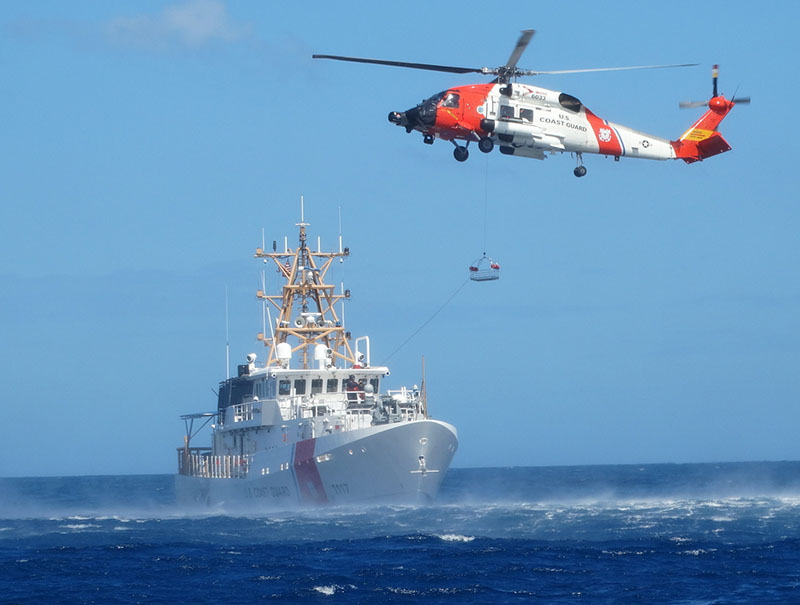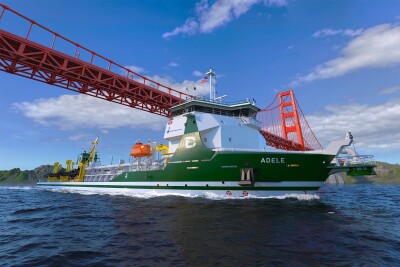Two weeks ago, I wrote in this space about moving the Coast Guard from its current home in the Department of Homeland Security to the Defense Department. It produced a flurry of well-reasoned comments from readers on both sides.
At that time, the issue had no particular urgency, but recent news events might have changed that.
Reports over the past few days that the Trump administration is considering deep cuts in the budgets of the Coast Guard and other federal agencies involved in national security to fund more aggressive immigration enforcement and pay for the infamous wall with Mexico could very well strengthen arguments that the nation's fifth and smallest military service should make the move.
This budget proposal made me wonder: Would the Office of Management and Budget have even thought of targeting the Coast Guard for cuts if it were not housed within the Department of Homeland Security? (OMB seems to be eying DHS agencies including the Transportation Security Administration and the Coast Guard to fund increases in the department's border control missions as DHS is part of the domestic discretionary budget that is vulnerable to cuts.)
To take this inquiry further, if the Coast Guard was ensconced within the Defense Department, perhaps it would be looking at a budget boost under Trump-promised increases in military spending instead of a 14% spending cut?
It's very troubling that the draft spending plan would slash the budget of a federal organization that is already overburdened with a dizzying set of national security, environmental and safety responsibilities, is already under-funded to accomplish them all, and is handling the workload with an obsolete fleet of ships and aircraft.
But what's more vexing to me, as a long-time observer of Coast Guard budget battles and mission inflation, is that this do-all service still struggles so hard to get the recognition and proper budget it needs.
I have covered numerous commandants who have appeared before Congress or in national speaking forums over the past 20 years extolling the "big bang for the buck" that this service provides as it constantly struggles to do more with less. But each time, these narratives seem to fall on deaf ears, as those responsible for crafting federal budgets and then acting on them in Congress — no matter the political party — have not followed through.
We have the same problem emerging again: a total lack of understanding among policymakers (with some notable exceptions) about just what the Coast Guard does, especially at a time of strong national security needs. The OMB proposal would cut $1.3 billion from the Coast Guard's $9.1 billion budget in 2017, targeting the Maritime Safety and Security teams, which board vessels during law enforcement and carry out counter terrorism patrols in ports and waterways. The plan would also cancel a contract to build a $500 million National Security Cutter. These savings would boost the DHS budget for border security.
Retired Coast Guard Commandant Adm. James Loy, who also served in top posts at DHS and TSA after he left the Coast Guard, said that the cuts would be felt "across the board, in all missions, including cutting back aircraft hours, cutter days at sea." Loy told Politico, which broke the story on the budget tit-for-tat, that "should it stand, it would be devastating to the organization."
The irony is that the Coast Guard is already heavily involved in border security, and last year stopped some 6,000 illegal migrants from entering the United States. As many security experts have pointed out, if you build a wall with Mexico, it will push the migrants and the drug smugglers from land to water, where they will seek coastal entries into the country. This would make the Coast Guard's presence in ports and along the coastlines even more important.
The irony was not lost on Rep. Duncan Hunter, R-Calif., who supported Trump's candidacy and chairs the House subcommittee on Coast Guard and Maritime Transportation. He told the Washington Post: "OMB has always treated the Coast Guard like a little piggy bank that they can do after whenever they need money for anything else. If the president is serious about going after the cartels and getting after drug networks, this makes no sense."
On the positive side, the national media attention to this leaked document could be helpful to the Coast Guard. Pictures of cutters and aircraft have accompanied articles in newspapers and TV stations across the country and the stories have allowed Americans to learn more about Coast Guard missions and services.
To put this in perspective, the draft budget plan is nothing more than a paper document at this point, reflecting the thinking of the federal budget agency that is notorious for making provocative proposals. It has not yet been officially proposed as the president's budget plan, which is due to Congress within the next few weeks, and could be altered as a result of this public disclosure. And if the plan does make it into Trump's budget proposal, it will have to pass through both chambers of Congress, where it is likely to meet a firewall of opposition from lawmakers in both parties.





